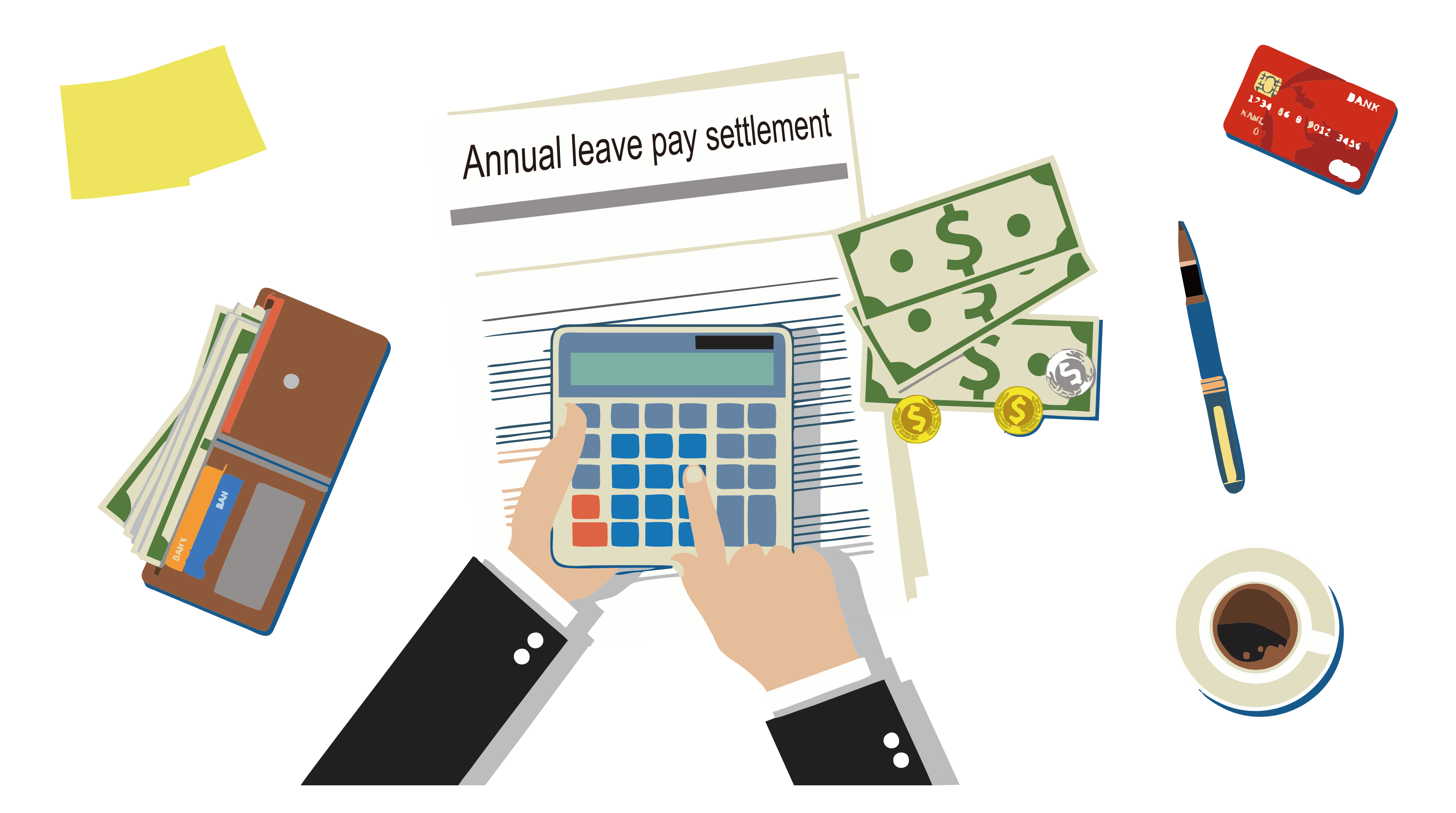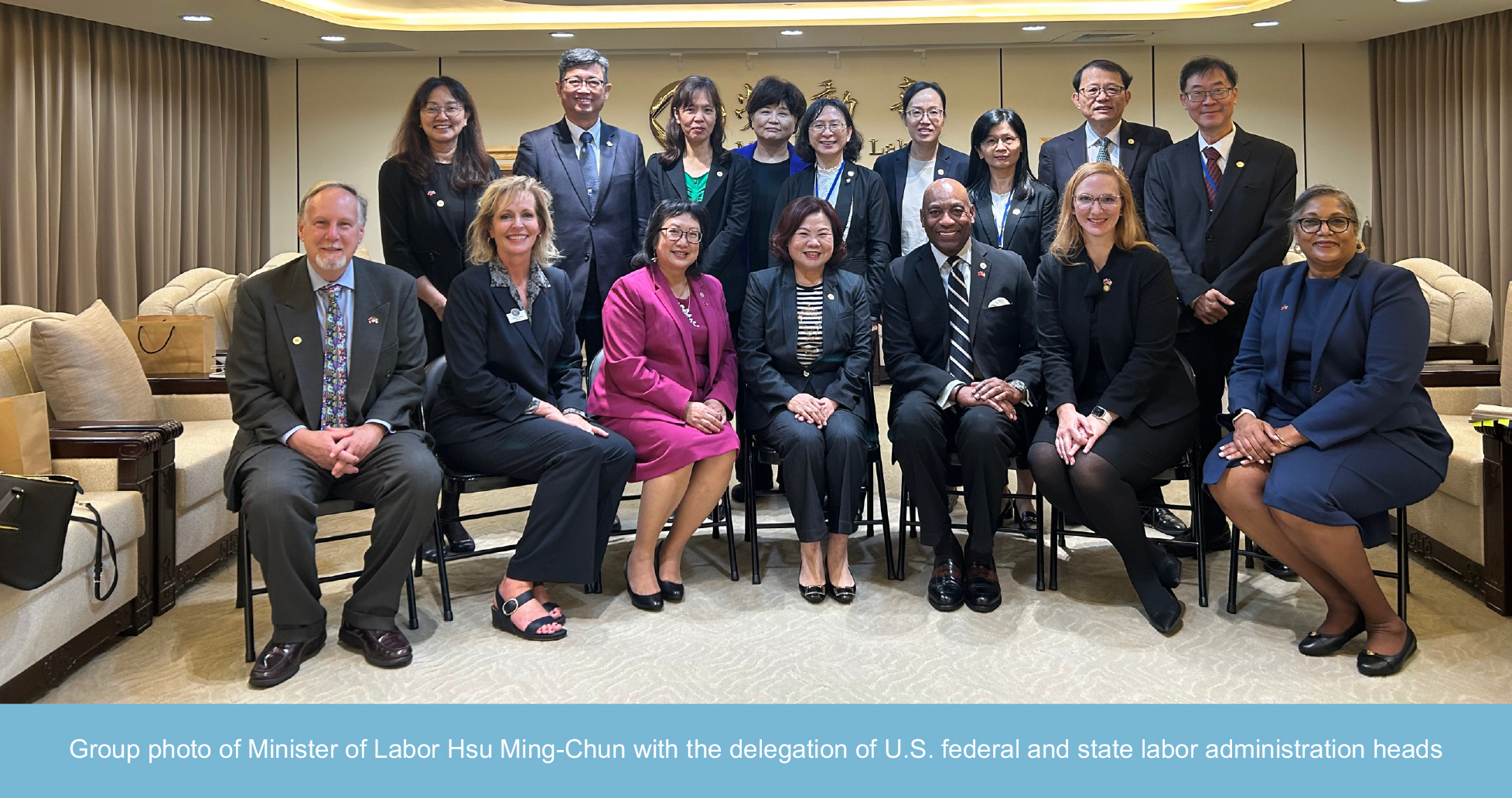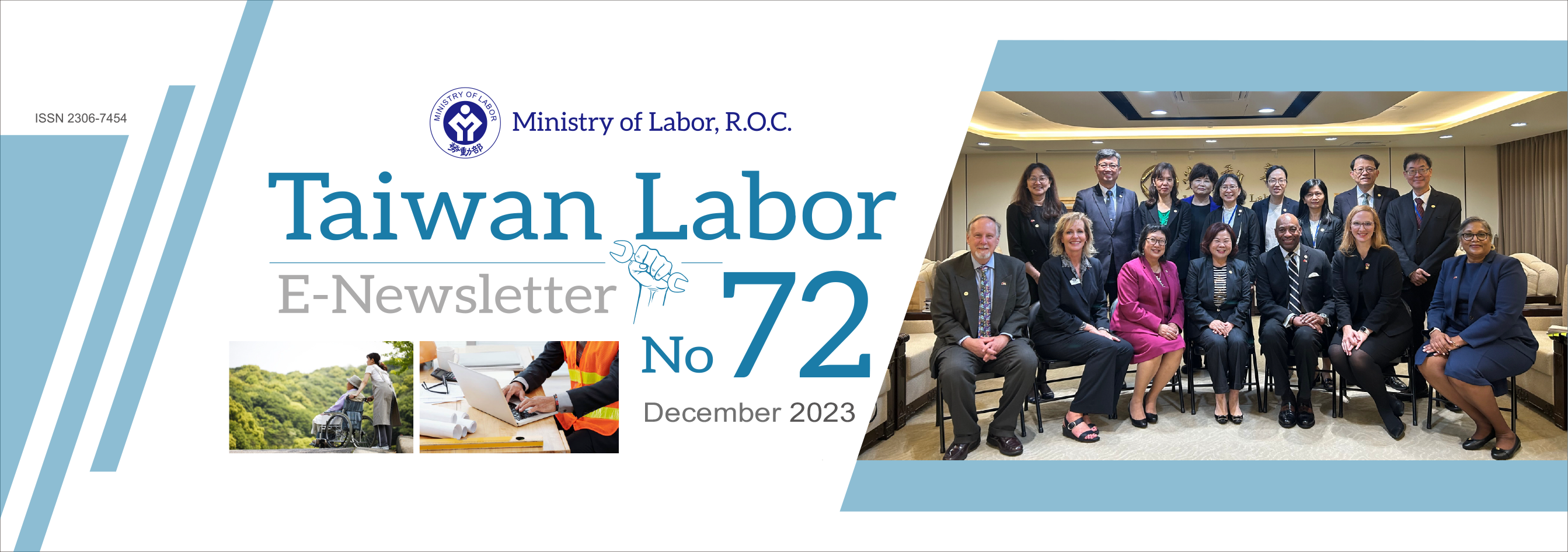NO.72
- Last updated:2023-12-13
- Clicks on the following title, but browses this article fast
- Policies & Regulations Simplified Application Process for Foreign In-Home Caregivers, Expanded Exemptions from Evaluations and Retention of Intermediate Skilled Workers Common Misconceptions of Annual Paid Leaves! Employers, Beware! Ministry of Labor Approves Regulatory Amendments Regarding the Inclusion of Personnel Employed in Election Campaign Activities by Candidates Running for Public Office in Insurance Coverage, Aiming to Safeguard Workers' Insurance Rights and Benefits
- News Outlook Minister of Labor Hsu Ming-Chun Meets a Delegation of U.S. Federal and State Labor Administration Heads Online Occupational Safety and Health Digital Learning Platform Adds a Variety of Courses, to Provide Employers and Workers with Convenient e-Learning Tools The Ministry of Labor Continues to Focus Efforts on Mediating Labor-Management Disputes, Safeguarding Labor Rights and Interests of Workers
Simplified Application Process for Foreign In-Home Caregivers, Expanded Exemptions from Evaluations and Retention of Intermediate Skilled Workers

The Ministry of Labor (MOL) has introduced a wider range of criteria for eligibility employed foreign in-home caregivers, for the convenience of people with caregiving needs. Additionally, the process for rehiring foreign caregivers for the elderly aged 75 years old and above or those with specific disability certification has been simplified. This eliminates the need for care recipients to repeatedly undergo assessments at medical institutions. Furthermore, in response to industry workforce demand, qualification criteria for intermediate skilled workers have been relaxed, and adjustments have been made to the calculation method for quotas of foreign institutional caregivers, in order to address labor shortages.
For foreign caregivers, three recognized categories of diverse qualifications have been added, including: I. Continuous utilization of long-term care services (in-home, during the day, or through family care services) for more than 6 months; II. Assessment of dementia, mild or more severe, by a neurologist or psychiatrist; III. Expansion of the exemption from assessment for those with severe levels of specific disabilities, with the removal of disease restrictions for those with physical impairments and rare diseases. Additionally, those with severe respiratory organ disabilities and moderate swallowing disabilities are now exempt from the need for assessment by medical institutions. Furthermore, the process of re-recruiting and employing intermediate skilled in-home caregivers has been simplified. Those who have previously employed foreign caregivers and whose care recipients are aged 75 years old or above, or those who hold disability certification without an expiration date are exempted from repeated disability assessments.
To increase the retention rate of intermediate skilled workers, the MOL has adjusted the requirements of foreign workers so that they are eligible for transfer to intermediate skilled positions after accumulating 6 years or more of work with the same employer. Additionally, new intermediate skilled positions have been designated in general construction work, and the scope of intermediate skilled positions in agriculture has been expanded to include forestry, livestock, and aquaculture, which is intended to enable experienced and skilled foreign workers to stay and work in Taiwan.
The calculation method for the quota of foreign institutional caregivers has also been adjusted in this revision. Classification requirements based on the size of an institution have been removed to allocate quotas for foreign institutional caregivers more fairly, regardless of an institution's scale.
The MOL has engaged in multiple dialogues with the private sector and society, and conducted inter-agency consultations. Through regulatory adjustments, it pragmatically responds to society's need for talent, assists industries in alleviating labor shortages, and reduces the burden on families caring for disabled individuals.
Keywords: Foreign In-Home Caregivers, Reassessment of Care Recipients, Intermediate Skilled Workers
Common Misconceptions of Annual Paid Leaves! Employers, Beware!

Annual paid leave is a statutory right for workers. According to Paragraph 2, Article 38 of the Labor Standards Act, annual paid leave is to be arranged by workers. As the end of the work year approaches, as leaves designated by industry establishments based on the calendar year (from January 1st to December 31st each year), any unused annual paid leave accumulated at a year's end shall be settled by the employer and paid to the worker as part of their wages. This payment shall be made irrespective of the reason such leave was unused, unless accumulated days of paid leave are carried over to the following year upon agreement by the employer and worker.
In practice, some employers are penalized due to a lack of understanding of regulations regarding annual paid leave. The Ministry of Labor has identified common misconceptions related to taking annual paid leave and the calculation of wages for unused annual paid leave, as explained below:
I. Common mistakes and misconceptions of employers related to employees taking annual paid leave:
II. Common mistakes of employers related to payment of wages for unused annual leave that may result in legal penalties:
If an employer violates the relevant regulations, workers may appeal to their local labor administrative authority (the labor bureau/administration or the social welfare department/administration of their local city/county government) to protect their rights and interests.
Keywords: Annual Paid Leave, Wage Settlement, Year End
Ministry of Labor Approves Regulatory Amendments Regarding the Inclusion of Personnel Employed in Election Campaign Activities by Candidates Running for Public Office in Insurance Coverage, Aiming to Safeguard Workers' Insurance Rights and Benefits

The Ministry of Labor (MOL) has announced that amendments to points 2 and 5 under the Notice on Participation in Labor Insurance, Employment Insurance and Labor Occupational Accident Insurance for Personnel Employed in Election Campaign Activities by Prospective Candidates and Public Office Candidates (hereinafter referred to as the "Notice") have been recently approved to safeguard the insurance rights and benefits of personnel engaged in election campaign activities by prospective candidates and candidates for public office.
The MOL states that candidates running for public office or individuals registered as candidates with the election commission, upon obtaining approval from the Control Yuan to establish dedicated accounts for political donations, should, in accordance with the provisions of the Labor Occupational Accident Insurance and Protection Act and the Employment Insurance Act, establish an insurance unit with the Bureau of Labor Insurance (BLI) if they employ personnel for election campaign activities. They are required to declare the enrollment of their employed workers in labor occupational accident insurance and employment insurance, and they may arrange for their enrollment in labor insurance.
The MOL specifies that, in accordance with the provisions of the Notice before the amendment, if a prospective candidate or candidate and their employed workers terminated their employment relationship, the employer was required to report the withdrawal from insurance coverage on the day the employed worker had resigned. If the employed worker did not resign, the employer would process the withdrawal from insurance coverage within 10 days from the date of the election. For those who failed to proceed with the above withdrawal regulations, the BLI would proceed with the withdrawal from insurance coverage directly on the 10th day after the election. In response to the practical needs of campaign personnel accompanying candidates for post-election activities, such as thanking voters and handling post-election matters, the employer's obligation to handle the withdrawal from insurance coverage is hereby extended to within 30 days from the date of the election. For those who fail to proceed the above withdrawal, the BLI's automatic withdrawal date has also been revised to the 30th day after the election ends. In addition, in accordance with the regulations of the Public officials Election And Recall Act and the Political Donations Act, two additional personnel categories, namely, chiefs administrator and representatives of congress of mountain indigenous district of special municipalities, have been included. This expansion aims to broaden the scope of application and safeguard insurance rights and interests of workers.
The MOL urges prospective candidates or public office candidates declare the enrollment of insurance for personnel engaged in election campaign activities in accordance with the regulations. This ensures comprehensive insurance benefits for the insured person, thereby avoiding penalties.
Keywords: Labor Insurance, Prospective Candidates, Candidates
Minister of Labor Hsu Ming-Chun Meets a Delegation of U.S. Federal and State Labor Administration Heads

Minister of Labor Hsu Ming-Chun met with a delegation of six U.S. federal and state labor administration heads on the afternoon of October 30, 2023. The visiting delegation included heads of labor administration agencies from the states of Alabama, Missouri, Oregon, and Wyoming, as well as senior officials from the Federal Mediation and Conciliation Service (FMCS) and the National Labor Relations Board (NLRB) of the U.S. This marked the largest-scale Taiwan-U.S. labor affairs exchange since the lifting of COVID-19 restrictions.
The Ministry of Labor (MOL) is the only international member of the U.S. National Association of Government Labor Officials (NAGLO). Every year, Taiwan sends representatives to attend the annual NAGLO conference and establish good relationships with U.S. federal and state labor administration heads. For this, since 1998, Taiwan's MOL has invited U.S. federal officials and state labor administration heads to visit Taiwan and establish a foundation for cooperation in labor affairs. The U.S. is also Taiwan's most significant ally and international partner, with both sides sharing universal values such as democracy, freedom, and human rights. Taiwan agrees with the U.S. "worker-centric" trade policy, which highlights the spirit of promoting labor rights and benefits while advancing trade relations, thereby developing a more inclusive labor policy.
During the visit of foreign dignitaries to Taiwan, arrangements were made for them to visit various entities, including the National Human Rights Commission, Control Yuan; Tainan City Government; Occupational Safety and Health Administration, MOL; Workforce Development Agency, MOL; and Institute of Labor, Occupational Safety and Health, MOL. The goal was to help them gain an overview of human rights protection, occupational safety and health, and workforce development in Taiwan. Additionally, the visiting delegation was taken on a tour of inclusive employment counseling units in Taiwan, to facilitate an understanding of how the MOL assists people with disabilities and disadvantaged job seekers in securing local employment. It is expected that through these engagements, a deeper understanding of Taiwan's labor policies and their effective implementation will be achieved, thereby fostering collaborative partnerships in labor affairs between Taiwan and the U.S.
Keywords: National Association of Government Labor Officials (NAGLO), Taiwan-U.S. Labor Affairs, International Exchange
Online Occupational Safety and Health Digital Learning Platform Adds a Variety of Courses, to Provide Employers and Workers with Convenient e-Learning Tools

Distance learning has become an international trend in the digital era. The Ministry of Labor (MOL) established the Online Occupational Safety and Health Digital Learning Platform in 2021, offering free online video courses for various industries. The courses are available in Mandarin and Taiwanese Hokkien, as well as translated into Indonesian, English, Thai, Vietnamese, and Filipino, which enables both domestic and international laborers to access 24/7 e-learning tools without geographical limitations. By leveraging diverse digital tools such as smartphones, tablets, or desktop computers, individuals can conveniently receive occupational safety and health education and training, thereby enhancing workers' competence in such domains.
In accordance with the relevant provisions of the Occupational Safety and Health Act, employers should require newly-employed workers or existing employees undergoing job changes to receive general safety and health education and training necessary for their position. They should also provide on-the-job safety and health education and training in accordance with the nature of the job. The certification hours obtained by workers through the Online Occupational Safety and Health Digital Learning Platform are considered equivalent to those acquired through traditional in-person education and training, and can be credited towards the above hours of safety and health (on-the-job) education and training required. As of the end of October 2023, the MOL has developed a total of 32 courses in the industries of construction, manufacturing, agriculture, forestry, catering, outreach agriculture, and courses on occupational safety and health for children and youth, among others. Approximately 248,000 individuals have obtained education and training hours, with over registered 275,000 individuals registering, achieving a pass rate of around 90% in the assessments.
The MOL shared that, starting from 2022, foreign workers have been able to quickly register using mobile devices such as smartphones. By simply scanning their alien resident certificates, individuals can complete registration, log into their accounts, and directly engage in online learning. In addition, in September 2023, the platform introduced a new public broadcasting feature. Upon prior application, business entities can facilitate simultaneous training for most employees by openly broadcasting digital teaching materials. This initiative encourages business entities establishments to utilize the platform for training purposes and for their employees to accrue hours of occupational safety and health training.
The MOL's Online Occupational Safety and Health Digital Learning Platform will continue to add relevant courses and enhance promotional efforts. Employers and workers are welcome to make extensive use of it.
Keywords: Online Occupational Safety and Health Digital Learning Platform, General Safety and Health Education and Training, Safety and Health (On-the-Job) Education and Training
The Ministry of Labor Continues to Focus Efforts on Mediating Labor-Management Disputes, Safeguarding Labor Rights and Interests of Workers

The Ministry of Labor (MOL) has revised the Guidelines on Subsidizing Administrative Agencies in Implementing Legal Aid for Labor-Management Disputes, as to expand the scope of legal aid for workers accompanied by lawyers during mediation and increase the number of recipients thereof. It also continues to train and certify independent mediators to ensure the protection of workers' rights and interests.
The MOL has established the Guidelines on Subsidizing Administrative Agencies in Implementing Legal Aid for Labor-Management Disputes to assist workers in safeguarding their rights and interests. For complex cases such as those involving occupational accidents, attorneys will be assigned for mediation. Considering the significant impact of wages and unlawful job transfers on workers' livelihoods, and the lack of legal resources for workers with disabilities and other special statuses, starting from late July 2023, wages and job transfers will be included in the scope of subsidization. Additionally, there will be no limitation on the requested amounts for indigenous individuals, people with disabilities, and new immigrants, as the Ministry hopes to provide robust assistance to workers.
The MOL provides a mediation process whereby workers are accompanied by labor lawyers. The MOL aims to continually enhance the quality and effectiveness of labor-management dispute mediation with measures like conducting certification training activities for mediators. In 2023, approximately 30 newly-appointed mediators underwent training through a four-week course (totaling 7 days), followed by written exams, oral exams, and practical exercises. Certificates were issued to those who passed the exams to better ensure the efficiency mediation for dispute resolution. Additionally, the MOL consistently organizes annual retraining for certified mediators. Last year, professional mediators from the U.S. Federal Mediation and Conciliation Service were invited to share their experiences with our domestic mediators through video conferencing. This year, separate retraining courses are being held nationwide in the northern, central, and southern regions to enhance and ensure the professional competence of mediation personnel.
In late September 2023, the MOL, in collaboration with judicial authorities responsible for the execution of labor mediation, organized the Seminar for Administrative Mediation and Labor Mediation Execution on Labor-Management Disputes. Judges, workers, and administrative mediation professionals were invited to participate, which provided a forum to share experiences and enhance the quality of administrative mediation.
Finally, the MOL emphasizes that the enhancement of mechanisms for mediating labor-management disputes is a key focus of its administration. In the future, it will continue to conduct a rolling review of related mechanisms to ensure comprehensive protection of labor rights and interests.
Keywords: Administrative Mediation, Legal Aid, Mediator Training
- Source:Department of General Planning
- Publication Date:2023-12-14
- Count Views:
File
- Taiwan Labor E-Newsletter No72 pdf

